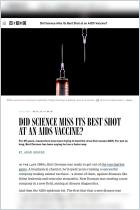
In: Science
Vaccination
Used for more than a thousand years, vaccination is the best method to prevent infectious diseases. It has eliminated smallpox, polio, measles and tetanus from most parts of the world. Despite this success, the anti-vaccination movement has many supporters and gained popularity, so much so that experts fear the return of nearly eradicated diseases. At present, several campaigns are underway to vaccinate against the severe acute respiratory syndrome coronavirus 2 (SARS-CoV-2) that causes Coronavirus disease 2019 (COVID-19).
Related Channels
Summaries
Why Emergency COVID Vaccine Approvals Could Pose a Dilemma
If approval comes before clinical trials end, this could complicate the study of vaccines’ long-term effects
Nature, 2020
What Landmark COVID Vaccine Results Mean for the Pandemic
Scientists welcome the first compelling evidence that vaccines can prevent COVID-19 – but questions remain about how much protection they offer, and for how long.
Nature, 2020
Mandate Vaccination with Care
Governments that are considering compulsory immunizations must avoid stoking anti-vaccine sentiment, argue Saad B. Omer, Cornelia Betsch and Julie Leask.
Nature, 2019
The Reemergence of Yellow Fever
Since 2016, yellow fever outbreaks have become a major public health concern
Science, 2018
STAT, 2020
Ethics of Maternal Vaccination
Involvement of women is critical in establishing guidelines
Science, 2017
Did Science Miss Its Best Shot at an AIDS Vaccine?
For 35 years, researchers have been trying to beat the virus that causes AIDS. For just as long, Burt Dorman has been saying he has a faster way.
Wired, 2018
















